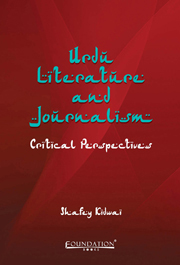Book contents
- Frontmatter
- Dedication
- Contents
- Preface
- Introduction
- Acknowledgements
- 1 Post-Independence Urdu Short Story
- 2 Post-Partition Urdu Poetry
- 3 Structuralism and Post-structuralism in Urdu Criticism
- 4 Jayant Parmar
- 5 Firaq as a Critic
- 6 Ghalib Criticism
- 7 Literature, Culture and Social Consciousness
- 8 The Influence of Tagore on Urdu Literature
- 9 Early Journalistic Endeavours of Sir Syed Ahmad Khan
- 10 Pioneering the First Urdu Book on Journalism
- 11 The Contribution of Urdu Journalists to the First War of Independence
- 12 Abul Kalam Azad's Journalistic Conquests
- Index
6 - Ghalib Criticism
An Overview
Published online by Cambridge University Press: 05 October 2014
- Frontmatter
- Dedication
- Contents
- Preface
- Introduction
- Acknowledgements
- 1 Post-Independence Urdu Short Story
- 2 Post-Partition Urdu Poetry
- 3 Structuralism and Post-structuralism in Urdu Criticism
- 4 Jayant Parmar
- 5 Firaq as a Critic
- 6 Ghalib Criticism
- 7 Literature, Culture and Social Consciousness
- 8 The Influence of Tagore on Urdu Literature
- 9 Early Journalistic Endeavours of Sir Syed Ahmad Khan
- 10 Pioneering the First Urdu Book on Journalism
- 11 The Contribution of Urdu Journalists to the First War of Independence
- 12 Abul Kalam Azad's Journalistic Conquests
- Index
Summary
No Urdu poet can vie with Mirza Asadullah Khan Ghalib (1797-1869) in terms of a dispassionate but uncontrived portrayal of the incongruities of human life. With a researcher's tenacity, he unwittingly transforms a myriad of experiences – sensuous, emotive, mystical and intellectual – into a unified pattern of unfading experience. His poetic method is clearly braced for converting the vagaries of daily life into excellent poetic material, interspersed with unsurpassable wit, and it leaves the literary critics and the common reader awe-struck.
In 1809, when Ghalib was only 12, his poignant poetry came in for a consummate discussion in Takizra Umda-e-Muntakhiba. Having praised the merits of the promising poet, Meer Mohammad Khan Suroor, the annalist, compared Ghalib with Mirza Abdul Qadir Bedil, one of the great exponents of the Ghazal. According to him, Ghalib effectively emulates the poetic diction of Bedil. Suroor's early adulation proved to be a straw in the wind as much ink has been expended over Ghalib's sterling contribution to the Urdu Ghazal in particular and other literary genres in general. Since the publication of his Urdu ‘Deewan’, hardly can any critic resist the temptation of focussing on Ghalib, no matter how plausible or non-perceptive his interpretation might be.
Ghalib's worldview and his matchless style, coupled with frequent use of paradoxes and witty comparisons or conceits has fired the imagination of innumerable critics and interpreters.
- Type
- Chapter
- Information
- Urdu Literature and JournalismCritical Perspectives, pp. 95 - 104Publisher: Foundation BooksPrint publication year: 2014

